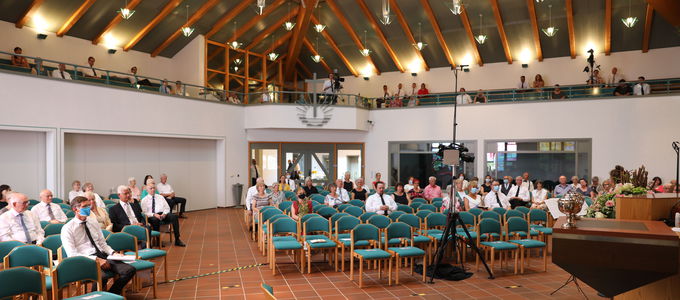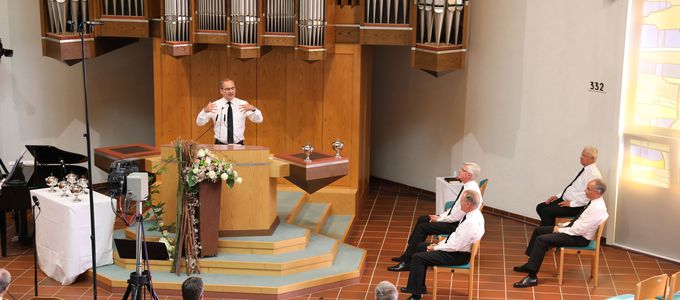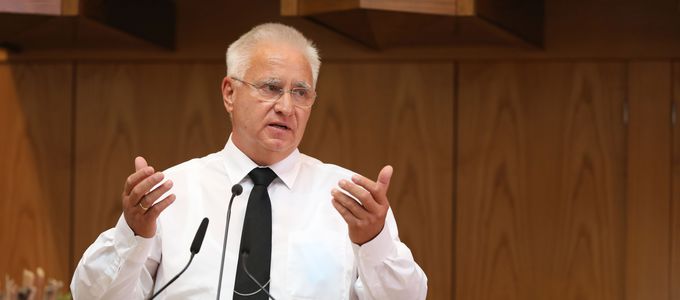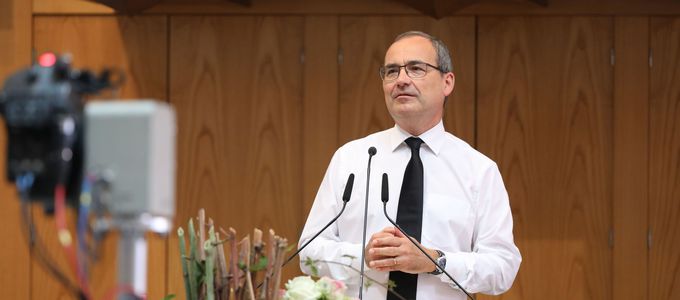Whether celebrating or mourning, Jesus’ love is not dependent on the situation
Jesus drank wine and John the Baptist was an ascetic. In that case neither of them could have been sent by God, could they?! Nevertheless, Jesus’ actions prove that He was indeed sent by God. And whoever follows the path that Jesus established has grounds for true joy.
In a divine service he conducted in Gifhorn in the northern part of Germany on 9 August 2020, Chief Apostle Jean-Luc Schneider elaborated on a Bible passage from Luke 7: 33–35: “For John the Baptist came neither eating bread nor drinking wine, and you say, ‘He has a demon.’ The Son of Man has come eating and drinking, and you say, ‘Look, a glutton and a winebibber, a friend of tax collectors and sinners!’ But wisdom is justified by all her children.”
Ascetic or glutton?
“Jesus reproached the scribes and Pharisees for failing to accept either Himself or John the Baptist,” said the Chief Apostle, explaining the context. “Both had been sent by God, and both were rejected.” Why? Because one lived as an ascetic—which the Pharisees found suspicious—and the other was always celebrating, which meant that He could not possibly have come from God. The Chief Apostle made it clear that both of these positions were nothing but lazy excuses. The Pharisees had a problem with the gospel, and because they did not accept the messenger who had been sent, they did not accept the Sender either.
Today too, there are Christians who have withdrawn from their faith because they have a problem with the ministers or their brethren in faith. Naturally, the Church is not perfect, but what really counts is to honestly ask oneself: “What is my attitude toward Jesus Christ and His message?”
No compromises
“Jesus Christ is absolutely uncompromising,” explained the Chief Apostle. “Today people would say that He is radical.” Jesus does not know compromise. He says:
- “If anyone desires to come after Me, let him deny himself.”
- “Seek first the kingdom of God and His righteousness.”
- “Inasmuch as you did it to one of the least of these My brethren, you did it to Me.”
“To attain salvation we must follow His path,” said the Chief Apostle. “There is no alternative.”
With His resurrection, Jesus proved the truth of His words. Today believers can be certain: even if many people no longer accept the gospel, “the truth of the gospel is not dependent on the number of those who believe”.
Calling and destiny
The Son of God not only celebrated, but at times also suffered from hunger and thirst. He too was sad from time to time. Why? “Because Jesus wanted to demonstrate: ‘I love all human beings. I identify with all human beings in all situations,’” said the Chief Apostle in response to this question. This means: no matter the situation in which a person finds himself, God grants everyone the same salvation.
In all the different situations Jesus experienced, He was steadfast and consistent. “He never forgot who He was or the purpose for which He had been sent,” emphasised the Chief Apostle. In this He is also an example for modern Christians: “Whether things are going well for us or not, let us always remember to ask ourselves: ‘Who are we?’” The Chief Apostle’s answer: “We have been destined to be with the Lord forever. We have been called in order to serve the Lord and our neighbour.”
From the way that Jesus enjoyed His life, we can see it is not true that a Christian must suffer in order to attain salvation. “And John the Baptist is the best proof that renouncing the pleasures of life and leading an ascetic lifestyle are no guarantee for salvation,” the Chief Apostle reminded the believers. Renouncing life’s pleasures is not necessary for salvation. All we need to do is follow.
Reason for joy!
“Why did Jesus eat and drink with His disciples?” asked the Chief Apostle before immediately answering his own question: “The Master was with them and had fellowship with them.” Today too, Christians have reason for joy:
- they share in the inheritance of God: “I am destined to experience this.”
- they experience the help and presence of God: “The Lord is there. He has not forgotten me.”
- they experience joy in fellowship: “God is right here with us in the fellowship of the believers!”
- they feel the joy of Holy Communion: “Here we have a foretaste of the festive supper that we will one day celebrate in heaven.”
- and they feel the anticipation of eternal fellowship with God: “Those who follow Jesus Christ can already rejoice today: soon the Lord will return and we will be with Him forever!”
Jesus demonstrated: what counts is not to live faithfully in accordance with the many laws contained in the Bible. “Rather, those who desire salvation must love God and their neighbour,” explained the Chief Apostle. The texts of the Bible merely show the perspective of the society of the time. And Jesus never wanted to change society. So what does He want then? “Jesus Christ wants our salvation!” assured the Chief Apostle. Those who believe in God and Jesus Christ, who follow Christ, and who love God and their neighbour can certainly also have a very positive influence on society. And they will experience the love of God.
Article info
Author:
Date:
Keywords:
Katrin Löwen
02.09.2020
Germany,
Chief Apostle,
divine services for ministers



























